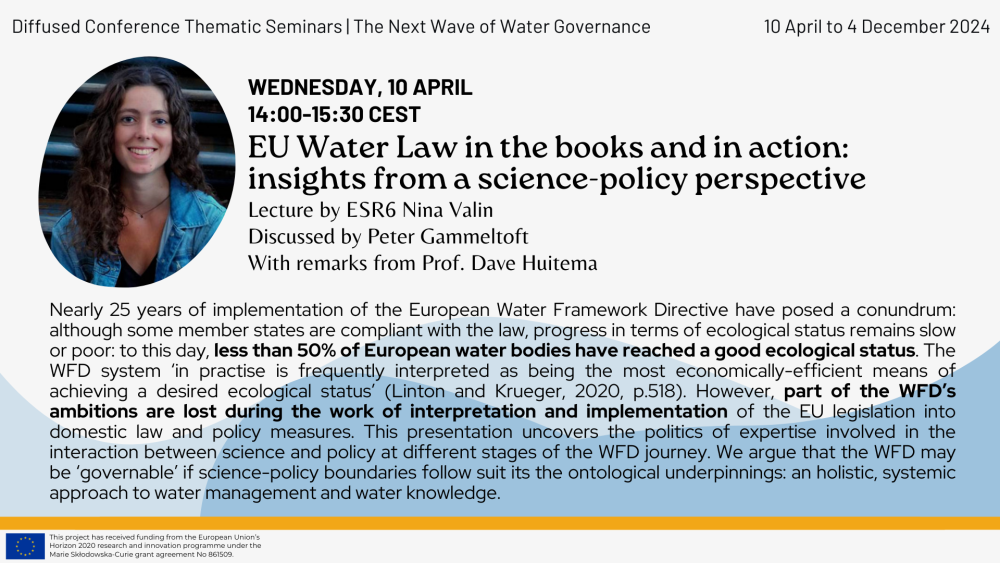EU Water Law in the books and in action: insights from a science-policy perspective | “The Next Wave of Water Governance” Diffused Conference Thematic Seminars
"EU Water Law in the books and in action: insights from a science-policy perspective" by Nina Valin (ESR6)
Nearly 25 years of implementation of the European Water Framework Directive (a binding legislation imposing requirements on water quality in European water bodies) have posed a conundrum: although some member states are compliant with the law, progress in terms of ecological status remains slow or poor: to this day, less than 50% of European water bodies have reached a good ecological status. What does this situation say about the Water Framework Directive? Is it ontologically unfit to improve water quality? Or is there some kind of fundamental problem in how it is implemented, even in compliant countries? Most recent academic debates attempt to elucidate whether the WFD’s lack of success can be attributed to minimal political will and an ‘implementation deficit’, or to some more existential problem within the WFD’s text itself. Some authors have recently argued that the legislation’s conceptual basis should be fundamentally revised. Behind this debate, a crucial question is that of governability: after all the efforts of the EU, experts and governments to harmonise measures and create common indicators, is there really a common language amongst water actors, and if so, does it actually help governing water quality?
Similarly to the reductionist view on WFD implementation, we argue that the Directive theoretically gives the means to achieve a transformation of water management that would favour better water quality. In fact, the WFD system ‘in practise is frequently interpreted as being the most economically-efficient means of achieving a desired ecological status’ (Linton and Krueger, 2020, p.518). However, part of the WFD’s ambitions are lost during the work of interpretation and implementation of the EU legislation into domestic law and policy measures. Using the analogy of transcoding cycles (i.e. iterative moments when the intentions and definitions of requirements from the WFD are re-interpreted), and echoing other studies on WFD implementation, we argue that the various interpretations of the WFD are a significant explanatory factor of the implementation gap. For this reason, the role of experts and scientists involved in interpreting EU law at different moments of the policy process deserves renewed attention.
This presentation uncovers the politics of expertise involved in the interaction between science and policy at different stages of the WFD journey. Although the purpose of these interactions is usually to bring a policy to fruition, some interests are favoured in the decision-making process depending on the power and political dynamics at stake, which do not enhance sustainable water practices (e.g. when scientists provide advice that is not being followed due to political interests or institutional constraints). We argue that the WFD may be ‘governable’ if science-policy boundaries (i.e. the relationship and power dynamics between State and expertise) follow suit its the ontological underpinnings: an holistic, systemic approach to water management and water knowledge. How this knowledge integration should take place can still be defined and inspiration can be found from the great diversity of science-policy approaches that exist across Europe.
About the speakers:
Nina Valin is a PhD student in the department of Environmental Policy Analysis of the Institute for Environmental Studies (IVM) at Vrije Universiteit Amsterdam. She is conducting her PhD as part of the NEWAVE Marie Sklodowska-Curie Innovative Training Network, and her project addresses the role of the interplay between experts and policy makers in policy change, taking the Water Framework Directive as a case-study.
Peter Gammeltoft is an expert on environment, water and climate change. He has worked at European Commission notably as the Head of the Water Unit within the DG Environment. During his time at the Commission, he has contributed to the drafting and adoption of the EU Water Framework Directive and many other environmental laws. He has also worked at the Miljøministeriet in Denmark.
Dave Huitema is professor and chair group holder Public Administration and Policy at Wageningen University and Research. His research is focused on the role of government in accomplishing transformations in the sustainability domain. Huitema has focused in the past on the ways in which individuals (so called policy entrepreneurs) can consciously affect policy dynamics, learning processes in government, but he has also focused on the way governments can enhance the societal impact of citizens collectives that seek to introduce more sustainable approaches. Huitema received his degree from Twente (M.A. and PhD) and previously worked for the Vrije Universiteit Amsterdam (2002-2022) and the Open Universiteit (2012-2022) as professor of environmental policy.
Schedule:
14:00 Welcome & introduction
14:10 Lecture by Nina Valin
14:30 Discussion with Peter Gammeltoft & Nina Valin
15:00 Remarks by Dave Huitema
15:10 Question with the audience
15:30 end of the seminar




